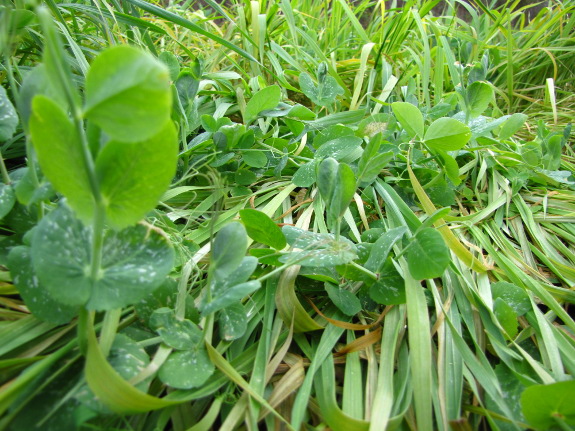
Austrian winter peas

Our winter cover crop
experiments this year aren't completely limited to figuring
out the best planting time. We're also trying a
new species --- Austrian winter peas. This variety of field pea
is supposed to reliably winterkill all the way to zone 6, so we
shouldn't have to worry about weed problems in the spring.
I've mostly steered
clear of legume cover crops since they serve a different role than
grains and crucifers. The latter do grab some of the free
nitrogen that might otherwise wash away over the winter, but their
primary purpose is to make lots of organic matter to improve your soil
long term. Legume cover crops have a different role --- to fix
nitrogen out of the air and lower your fertilizer inputs. I was
most interested in soil building, so skipped the legumes at first.
I couldn't resist trying
out Austrian winter peas, though, and not just because everyone was
talking about how cool they are. My primary purpose was to plant
them in the chicken pasture to give our flock some tasty, high protein
greenery at this time of year. Strangely enough, my chickens
seemed to prefer the oat leaves, although they may change their tune as
winter progresses. But since I was buying the seeds anyway, I
figured I should try Austrian winter peas in the vegetable garden as
well.

Field peas grow best if
mixed with a small grain (like oats) so that the peas have something to
climb. I noticed that my peas tended to pull the oats down a bit,
perhaps negatively affecting how well the oats will grow. But
I've enjoyed the duo anyway because the peas started coming into their
own this month, just as the oats slowed down.
The real question will
be how well the Austrian winter peas break down in the spring, and how
much they reduce my dependence on manure. As Harvey Ussery
pointed out in his awesome book The
Small-Scale Poultry Flock, if you keep adding off-farm
compost or manure to supply your vegetable garden with nitrogen, you
may eventually end up with toxic levels of phosphorus and potassium in
your soil. My
soil is already
quite rich in both of these nutrients, so it wouldn't hurt to dial back
my manure applications and try to grow the more ephemeral nitrogen on
site.
Want more in-depth information? Browse through our books.
Or explore more posts by date or by subject.
About us: Anna Hess and Mark Hamilton spent over a decade living self-sufficiently in the mountains of Virginia before moving north to start over from scratch in the foothills of Ohio. They've experimented with permaculture, no-till gardening, trailersteading, home-based microbusinesses and much more, writing about their adventures in both blogs and books.
Want to be notified when new comments are posted on this page? Click on the RSS button after you add a comment to subscribe to the comment feed, or simply check the box beside "email replies to me" while writing your comment.
